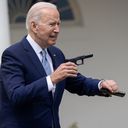What to know about ghost guns and Biden's new rule to curb them

President Biden last week announced a new rule to regulate "ghost guns," untraceable firearms that are becoming more prevalent in the U.S.
Why it matters: According to government data, 20,000 suspected ghost guns were recovered in criminal investigations in 2021, a tenfold increase in just five years.
What is a ghost gun?
Ghost guns are bought in pieces and assembled by the owner. They don't have serial numbers, so they are untraceable by law enforcement.
- Because the individual parts themselves generally aren't legally considered firearms, anyone can buy them. That makes it easy to bypass background checks and firearm registration.
Are ghost guns legal?
It is legal for private citizens to build their own guns. Commercially produced firearms are another matter.
Background: In the wake of the assassinations of Martin Luther King Jr. and Sen. Robert Kennedy, Congress passed the Gun Control Act of 1968:
- It required commercial firearms producers to be federally licensed.
- Firearms had to have serial numbers.
- Those commercially produced firearms could not be sold to certain groups, such as felons.
Yes, but: Because ghost guns aren't made by companies, they aren't subject to these regulations as long as the owner doesn't sell them.
Who makes parts for ghost guns?
There are many companies selling so-called "buy build shoot kits" online. These kits contain parts, such as frames and receivers, that are not complete enough to meet ATF definitions of firearms.
- The buyer of the kit can complete the parts and assemble the gun themselves.
Zoom in: One of the highest-profile kit makers is Polymer80, which the Los Angeles Police Department said made up nearly 90% of the ghost guns the department recovered in 2021.
- Polymer80's headquarters in Dayton, Nevada, was raided by the ATF in late 2020, but the agency has been quiet about its investigation since.
Other methods for building ghost guns are buying pieces individually or even 3D printing them.
What will the new rule do?
Under the new rule, the ATF will change its definition of a firearm to include unfinished parts like frames and receivers, which means serial numbers will be required and dealers selling the parts will need to run background checks on buyers.
- It will take effect 120 days after it appears in the Federal Register.